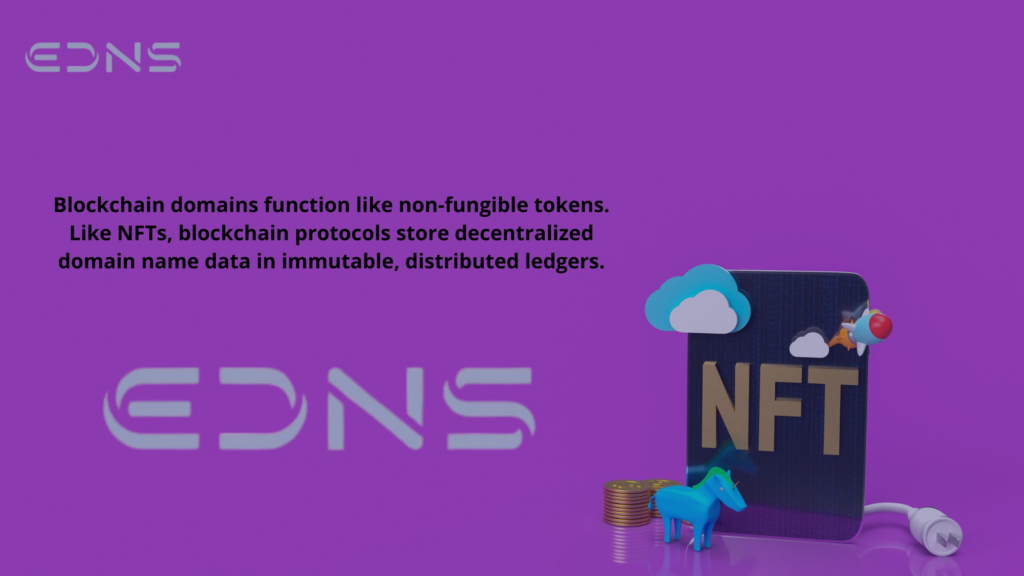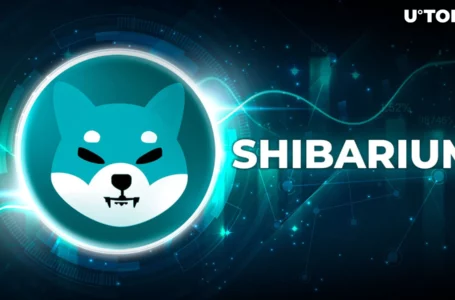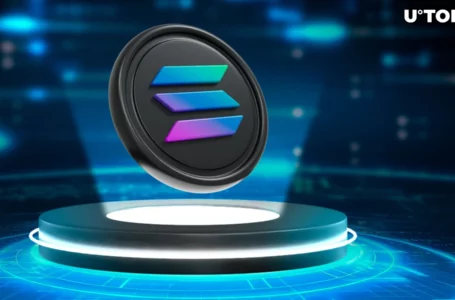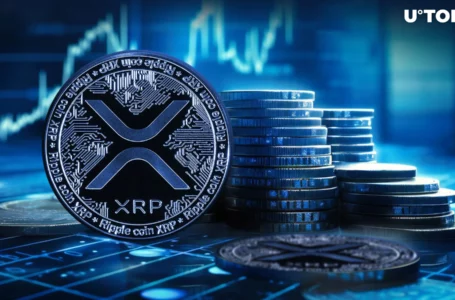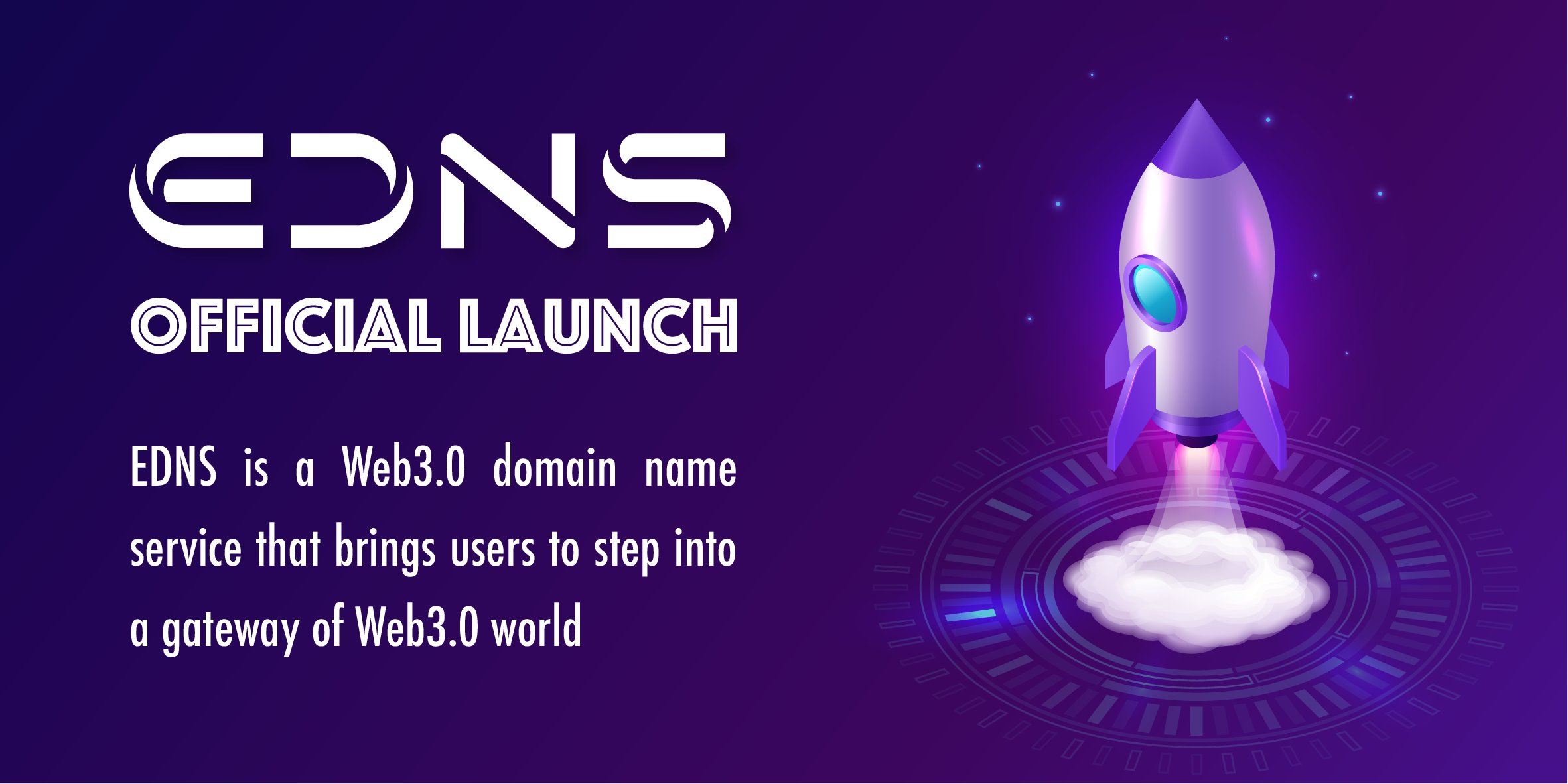
EDNS is a complete all-in-one solution for decentralized domain and hosting as well as digital identity to access the infinite world of NFT, Metaverse and DeFi. EDNS provides a platform service that issues decentralized domains to users and creates a bridge to ease traditional Web 2.0 users into the decentralized era of Web3.0.
What is Ether Domain Name Services (EDNS)?
EDNS (Ether Domain Name Services) is a name and lookup service built on the Polygon blockchain, a layer 2 scaling solution for Ethereum and its compatibles, with Ethereum allowing crypto users to translate their machine-readable addresses into human-readable addresses. The service provides decentralized domain naming service for demands related to Web3.0, including NFT, cryptocurrency wallet, web hosting, DeFi ID and GameFi ID in the digital world.
EDNS, short for Ether Domain Name Services, simplifies the crypto space and decentralized finance by allowing users to create simple aliases for all their public addresses and decentralized websites. In a step forward among existing decentralized domain platforms, EDNS will also provide direct connection with decentralized storage, decentralized web hosting, Web Builder, and decentralized messaging services and SMS verification features that will significantly enhance web security and privacy protection. Through EDNS domains, users can manage smart contracts and realize their vision of an authentic decentralized future, free from the control of IP administrators.
What is the main purpose of DNS?
Blockchain-based naming systems have evolved from the traditional Domain Name System (DNS). The primary purpose of DNS is to translate human-readable domain names into corresponding IP addresses that identify resources on the Internet. This resolution is done using domain name servers that are centralized and typically owned by some large organization that provides authority. However, the decentralized network will build a new completely open and decentralized naming system on the blockchain.
The ecosystem will support resolving domains, eg hello.meta, for different resource types depending on the desired use case. A wallet or plugin will be provided to the user to resolve the decentralized domain name. Thus, this wallet manages the decentralized resources with the relative token and the gateway to the new decentralized world of the traditional internet world.
Each domain is represented as a non-fungible token (NFT) representing ownership by a designated owner. The owner can map the domain name to the hash address designated in Web 3.0 resources. Also, just like traditional DNS, the owner can manage the subdomain name and register with NFT.
How does the Ether Domain Name Service (EDNS) work?
The decentralized domain name service, called the Ether Domain Name Service (EDNS), manages access to the designated file location. Users can register their domain name on top of top-level domain (like .META) with smart contract based on ERC-1155 token standard. As a result, it is possible to support existing public chain ecosystem such as Ethereum or IPFS. It is also possible to trade on the NFT market as the domain name is mapped to an NFT in the ERC-721 token standard.
As the future of the blockchain network provides decentralized storage with web hosting services, it is assumed that a default subdomain with “www” is reserved for anyone browsing the web across the network. In the existing Internet world, the crypto wallet (like MetaMask) becomes a gateway/proxy role to access the decentralized network. Wallet is a plugin that requires installation on existing modern web browser and can manage EDNS registered to access decentralized network without memorizing a very long hash code address.
EDNS has the following characteristics:
- A smart contract stores the domain name (including the subdomain name) and supports any language.
- The domain name owner can control the domain name through the crypto wallet.
- Backward compatibility of traditional web applications accessible from any modern web browser.
- The owner can customize the domain name, which is unique in the decentralized network.
- The domain name can be traded on the market.
Decentralized Domain Names
A decentralized domain name is an identification string that defines a domain of administrative autonomy, authority, or control within Web 3.0. It is used for application-specific naming and addressing purposes. In general, a decentralized domain name identifies a hash address defined on the public blockchain network. Decentralized domain names are formed by EDNS rules and procedures.
Any name registered with EDNS is a decentralized domain name. It can be organized into subordinate levels (subdomains) of the unnamed EDNS root domain. The first-level set of decentralized principal names are the top-level decentralized domains such as the prominent domains meta, ass, 404, music. Below this top-level decentralized domain in the EDNS hierarchy are second-level decentralized names that are typically opened for reservation by EDNS owners who want to connect to a different location within the decentralized Web 3.0 resources, create other publicly accessible resources, or run decentralized websites.
Public Blockchain (Name Chain)
Similar to the current domain name system, EDNS is maintained by a public blockchain (Name Chain). Crypto wallet that can resolve EDNS can give answers to EDNS queries from name string and resolve EDNS to real location hash address. The hash address is mapped to a decentralized resource such as decentralized storage or decentralized web hosting. Also, an owner can own more than one EDNS and map to the same hash address.
EDNS: DeFi Resource Locator Component
To access a decentralized storage with EDNS, the user must install a plugin in the modern web browser as a gateway to access the decentralized network. EDNS is a component of the decentralized resource locator (DRL) used to access the decentralized resource. Example: DRL: xtp://www.example.meta
Note that the xtp protocol is the name for signaling the gateway that accesses the decentralized network instead of the internet. If the gateway (plugin) is not installed in the modern web browser, the browser will not return anything (or recognize it as a keyword search in the search engine).
Second level name registration
User can register EDNS second level name through EDNS official website EDNS. The registration record is registered with an NFT which can resell on the NFT market. If the owner wants to map the EDNS to its decentralized resource, the management site under EDNS can map the name to the designated hash address.
Similar to the current domain name system, the EDNS owner can manage any subdomain under the main EDNS. The ENDS subdomain can be mapped to any decentralized storage bucket, folder, or hash address.
Ether Domain Name Services Features
DeDrive
DeDrive is a layer 2 decentralized storage solution to support the upcoming EDNS ecosystem. DeDrive acts as a data hotspot to access encrypted data stored on different Tier 1 decentralized storage players as well as established cloud service providers, making it a bridge between Web 2 and Web 3 storage solutions.
EDNS Message
EDNS Message is a feature on top of the EDNS platform that integrates mobile messaging in Web 3.0 technology. This feature is the first in the blockchain market to connect Web 3.0 with traditional telecom services as a way to protect the security of digital asset transactions.
As the first official global release to integrate SMS functions across decentralized domains, cross-domain communication that does not require identification. This function is convenient in the new era where websites and open links are susceptible to attack, as a resolution of mandatory input of private information to just share wallet address, users can now freely communicate with their networks through their registered domain .
EDNS Chrome Extension
With the EDNS Chrome extension, you can:
- Use EDNS Web 3 domains to access websites
- Look for linked wallet addresses
- Look for linked text records including email address, URL, avatar, description and social media identifiers
NFTs: Are Domains the New Metaverse?
There’s a new crypto land grab, and it’s not just the technology of Tokens non-fungibles (NFTs) of digital art. We are talking about decentralized domains built on the addresses of the Ethereum-blockchain name service. These names are the gateway to the Metaverse.
How decentralized domains are NFTs?
Blockchain domains work like non-fungible tokens. Like NFTs, blockchain protocols store decentralized domain name data in distributed, immutable ledgers. An NFT represents a digital asset such as an image, video, audio file, GIF or domain name on a blockchain network. NFT domains or crypto domains are unique domains represented by an NFT. Popular domain NFTs include Business.com, lasvegas.com and voice.com, and crypto.com. Similar to NFTs, domain names:
- They are unique.
- Your data is immutable.
- Each name has exceptional inherent value.
- A domain can change ownership.
What are domain NFTs utilities?
NFTs, prove the provenance and ownership of the assets. However, the NFT domain name has other benefits that include:
Domain NFTs as Crypto Addresses
First, you can use them as wallet addresses to send and receive cryptocurrencies and tokens. To illustrate this point, an Ethereum wallet address is 42 hexadecimal characters, such as 0xb6060BFb836897EAECa521A7C2BE728D9BB5CE92. Sending this address to friends or customers for payments is risky and difficult to track.
The Ethereum Domain Name Service (EDNS) works as a DNS system for web 3.0. It will change that long and complicated wallet address to a simple and easy to use wallet address or domain like mike.eth. Anyone on the web can submit payments to mike.eth.
Domain NFTs as an Investment Strategy
Second, you can resell NFT domains for profit. As an illustration, amazon.eth has an average ask price of 66 ETH, while nike.eth has an average offer price of 9,45 ETH. NFT domains are scarce thanks to the transparency and immutability of blockchain technology data. Reselling an attractive NFT domain on the secondary market can generate significant profits. With more utility than digital art NFTs, we like it better today.
Domain NFTs as Decentralized Website Domains
Third, you can use NFTs domains to host web 3.0 sites. All you need to do is connect your decentralized domain to a website address. You can use URLs to create censorship-proof websites via IPFS. That said, most popular browsers do not support decentralized domain names. While you can turn your blockchain domain name into a full-fledged website, for your e-commerce business, Web 2 search engine processes such as Google page indexing and web crawlers may not favor them. , as regular domain names.
Let’s say you already have a Medium blog, but you want to create a Substack page. However, you cannot easily integrate your Medium content into your new platform. This is because Medium disapproves of copying and pasting, and Google may also deprioritize your content on Substack due to its SEO structure. So you’ll have little choice but to start a new blog, losing your Medium account’s content, followers, and stats. Web 3 domains solve this problem by giving you full ownership of your content. Additionally, you can move your content across the web to other decentralized domains.
Domain name ownership
Also, unlike general domains, which need periodic renewal fees, payments for NFT domains occur only once. Therefore, there are no renewals in domain name services. On the other hand, web 2.0 domains need annual renewals because they are centralized.
Consequently, you don’t buy a web-2 domain, you rent it. If you don’t renew it, you will lose ownership of the domain name. However, NFTs domains are decentralized, which means you have full control over them; no central authority is involved. To get your first decentralized NFT domain, go to edns.domains. Then pre-register your desired domain name in the upper right corner of the web page.
Domain NFTs as Digital Identities
Domain names can also direct buyers to your digital properties. They are a portal that connects customers to brands. A unique NFT domain will help your brand stand out from the crowd in the metaverse world. For example, a descriptive domain like coffee, clothes, etc. will help other users to know more about your products or services. Also, an NFT domain name can show your business name, relevance, and industry.
How to Earn with Domain Name NFTs?
Like the metaverse NFTs, domains allow users to own a virtual realm in the Metaverse. You can buy and resell your Metaverse NFTs for profit. But first, research and identify trending NFTs domains. So, similar to any other investment asset, look to buy low and sell high. OpenSea, allows you to create collections of pre-built metaverse domains and resell them.
Alternatively, create your NFTs domains and sell them. There are decentralized domain servers that provide pre-registration opportunities for users ready to create a new domain name at no cost. First, search for popular topics and names and create trending keywords and topics through an NFT domain service like hello.meta. Then move your NFT to the market for sale.
Bottom Line
Ether Domain Name Services is a platform that acts as a gateway between Web 2.0 users to enter Web 3.0. Providing decentralized domains for community members who want to use it for domain purposes, wallet addresses, business owners or independent investors who want to enter the metaverse, etc.
